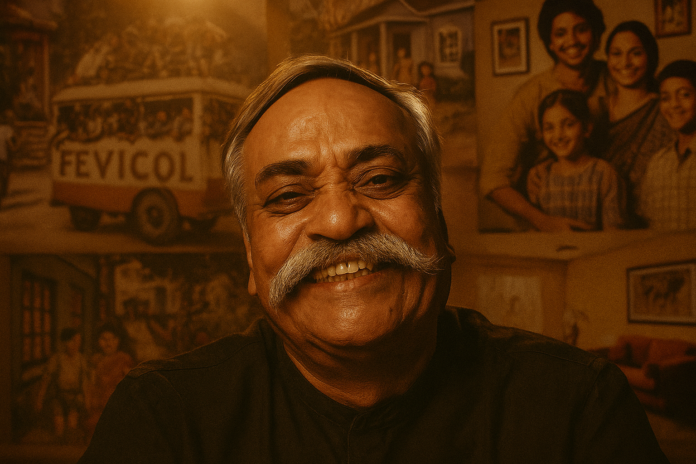Imagine sitting in front of your TV. A small room appears on the screen — old family photos hanging on the wall, children’s toys lying in a corner. A soft voice says, “Har ghar kuch kehta hai.” Suddenly, your own home flashes before your eyes — your walls, your laughter, your memories.
That’s the magic of Piyush Pandey — the man who made advertising feel like a story, not a sales pitch. He turned commercials into conversations, products into emotions, and ads into memories.
The Story of a Dreamer
Born in a modest family in Jaipur, Piyush Pandey once dreamed of becoming a cricketer.
After studying English Literature, he joined the world of advertising — a world that would one day carry his signature forever.
When he joined Ogilvy India in the 1980s, Indian advertising was dominated by polished English copy and Western imagery. Piyush changed everything. He believed that if you wanted to speak to Indians, you had to speak their language — the language of emotion.
He often said, “If your mother doesn’t understand your ad, it’s not a good ad.”
That simple philosophy became the cornerstone of his legendary career.
When Walls Began to Speak
Remember the iconic Asian Paints campaign? “Har ghar kuch kehta hai” — every home tells a story. In one poetic line, Piyush captured the deepest emotional truth of every Indian household.
He understood that walls aren’t just made of bricks and cement. They hold laughter, tears, dreams, and memories. When a paint brand connected to that emotion, it became part of our identity — not just a product.
Piyush knew that Indians don’t just buy products. They buy stories, emotions, and dreams. That’s why instead of glorifying the product, he told tales of love, family, and belonging.
The Fevicol Phenomenon: When Humor Stuck
And then came Fevicol — the glue that bonded an entire nation’s sense of humor.
Who can forget the overloaded bus ad? Dozens of people hanging from every corner, yet the bus still moves — held together by Fevicol’s “unbreakable bond.”
We all laughed, because it felt real. We’ve all seen that bus on the street — chaotic, crowded, but alive.
Piyush wasn’t just talking about glue. He was talking about the invisible glue that holds India together — our unity in chaos, our togetherness despite differences. That’s storytelling at its finest — humor that makes you smile and think at the same time.
When Advertising Became a National Anthem
Piyush Pandey didn’t stop at commercials. He became the creative voice of a nation.
His work on “Mile Sur Mera Tumhara” still gives us goosebumps — a campaign that celebrated India’s unity in diversity through music and faces we all loved.
And then came “Do Boond Zindagi Ki” — the Pulse Polio campaign that changed public health in India. He didn’t just talk about vaccines. He spoke to the hearts of parents, telling them those two drops meant life for their children.
The Art of Speaking the People’s Language
Piyush’s greatest gift was his simplicity. He didn’t rely on big words or flashy visuals — he relied on human truth.
Every ad he made felt like a conversation — as if he was sitting beside you, sharing a moment from life. He didn’t lecture or persuade. He connected.
That’s why his ads weren’t just successful — they became part of our cultural memory.
When we talk about strong bonds, we still say “Fevicol ka mazboot jod.”
When we talk about home, we still remember “Har ghar kuch kehta hai.”
A Legacy That Lives On
In today’s digital world, we scroll past hundreds of ads every day — yet Piyush Pandey’s creations remain unforgettable. Why? Because he knew something timeless:
Technology changes. Platforms change. But human emotions don’t.
His honors — the Padma Shri, the Cannes Lions, and his global leadership at Ogilvy — are testaments to his genius. But his true legacy lies in every young advertiser who still tries to follow his path: to tell stories that feel real.
Piyush Pandey’s Lessons for the New Generation
In the age of AI, algorithms, and data-driven advertising, Piyush Pandey’s wisdom feels even more relevant.
He taught us that:
- No algorithm is stronger than emotion.
- No data is more valuable than the human heart.
- Don’t try to impress people — try to connect with them.
His message to today’s creators is simple yet profound: “Don’t aim to be complex. Aim to be honest.”
The Storyteller Who Taught Ads to Feel
At his core, Piyush Pandey is a storyteller. He preferred telling stories over selling products.
And those stories felt like our stories — full of laughter, nostalgia, and truth.
He showed us that the best communication doesn’t speak to the mind; it speaks to the heart. A great ad doesn’t just sell — it adds a moment of joy, meaning, or reflection to our lives. Even today, his work reminds us who we are, what we believe in, and what makes us smile. And that, perhaps, is the greatest gift of all — to create something that isn’t just seen, but felt.


